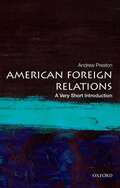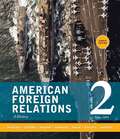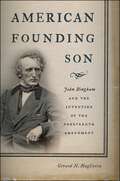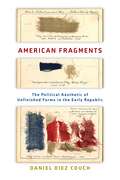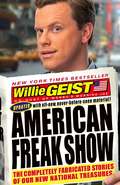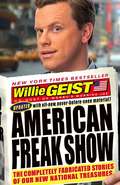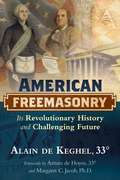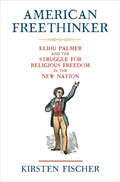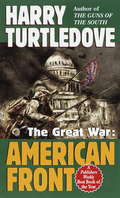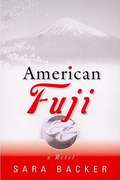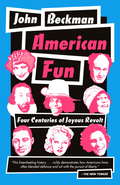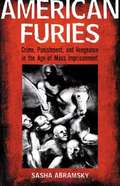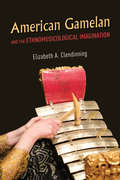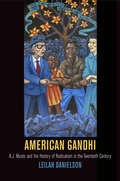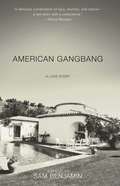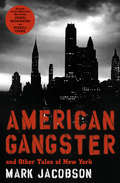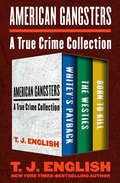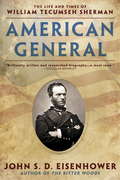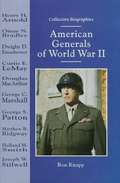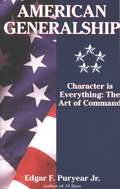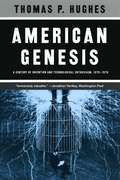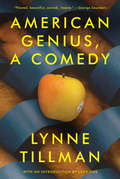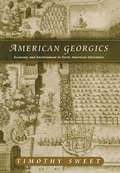- Table View
- List View
American Foreign Relations: A Very Short Introduction (Very Short Introductions Ser.)
by Andrew PrestonFor better or worse--be it militarily, politically, economically, technologically, or culturally--Americans have had a profound role in shaping the wider world beyond them. The United States has been a savior to some, a curse to others, but either way such views are often based on a caricature of American actions and intentions. American Foreign Relations, then, is a subject of immense global importance that provokes strong emotions and much debate, but often based on deep misunderstanding. This Very Short Introduction analyzes the key episodes, themes, and individuals in the history of American foreign relations. While discussing diplomacy and the periods of war that have shaped national and international history, it also addresses such topics as industrialization, globalization, imperialism, and immigration. Covering the Revolution through the War on Terror, it examines the connections between domestic politics and foreign affairs, as well as the importance of ideals and values. Sharply written and highly readable, American Foreign Relations offers a clear-eyed narrative of America's role in the world and how it has evolved over time.
American Foreign Relations: Volume 2: Since 1895
by Brigham Thomas Paterson Michael Donoqhue Kenneth Hagan J. Garry CliffordThis best-selling text presents the best synthesis of current scholarship available to emphasize the theme of expansionism and its manifestations.
American Founding Son: John Bingham and the Invention of the Fourteenth Amendment
by Gerard N. MaglioccaA history of the origins of the 14th Amendment and the the man who helped craft itJohn Bingham was the architect of the rebirth of the United States following the Civil War. A leading antislavery lawyer and congressman from Ohio, Bingham wrote the most important part of the Fourteenth Amendment to the Constitution, which guarantees fundamental rights and equality to all Americans. He was also at the center of two of the greatest trials in history, giving the closing argument in the military prosecution of John Wilkes Booth’s co-conspirators for the assassination of Abraham Lincoln and in the impeachment of President Andrew Johnson. And more than any other man, Bingham played the key role in shaping the Union’s policy towards the occupied ex-Confederate States, with consequences that still haunt our politics.American Founding Son provides the most complete portrait yet of this remarkable statesman. Drawing on his personal letters and speeches, the book traces Bingham’s life from his humble roots in Pennsylvania through his career as a leader of the Republican Party. Gerard N. Magliocca argues that Bingham and his congressional colleagues transformed the Constitution that the Founding Fathers created, and did so with the same ingenuity that their forbears used to create a more perfect union in the 1780s. In this book, Magliocca restores Bingham to his rightful place as one of our great leaders.
American Fragments: The Political Aesthetic of Unfinished Forms in the Early Republic
by Daniel Diez CouchIn the years between the independence of the colonies from Britain and the start of the Jacksonian age, American readers consumed an enormous number of literary texts called "fragments." American Fragments recovers this archive of the romantic period to raise a set of pressing questions about the relationship between aesthetic and national realities: What kind of artistic creation was a fragment?, And how and why did deliberately unfinished writing emerge alongside a country that was itself still unfinished?Through discussions of eighteenth-century transatlantic aesthetics, the Revolutionary War, seduction novels, religious culture, and the construction of authorship, Daniel Diez Couch argues that the literary fragment was used as a means of representing individuals who did not fit neatly into the social fabric of the nation: beggars, prostitutes, veterans, and other ostracized figures. These individuals did not have a secure place in designs for the country's future, yet writers wielded the artistic form of the fragment as an apparatus for surveying their disputed positionality. Time and again, fragments asked what kind of identity marginalized individuals had, and how fictionalized versions of their life stories influenced the sociopolitical circumstances of the emergent nation. In their most progressive moments, the writers of fragments depicted their subjects as being "in process," opting for a fluid version of the self instead of the bounded and coherent one typically hailed as the liberal individual.Traversing aesthetics, political philosophy, material culture, and history, American Fragments gives new life to a literary form that at once played a significant role in the print ecology of the early republic, and that endures in the works of modernist and postmodernist writers and artists.
American Freak Show
by Willie GeistThis is not the first book written about quantum mechanics, but it just might be the last. The theory presented inside these pages is so revolutionary that it has stunned the scientific community into reconsidering centuries of thought about the behavior of energy and matter. Prepare to have your mind blown. Sorry, that's the introduction to Willie Geist's next book--the culmination of his life's work. Look for it next spring, just in time for Mother's Day. This book is about his other passion: freaks. When he's not in the lab, Geist spends his time on MSNBC's Morning Joe sifting through the wreckage of American politics and popular culture. These days, that's a big job. With an Alaska hockey mom turning, almost overnight, into a national icon and threatening to move from Wasilla to the White House, with the world's most famous athlete now associated less with the Masters and more with the strippers, and with reality TV working around the clock to ensure the constitutional right of every man, woman, and child to fifteen minutes of fame, Geist's business is thriving. In his hilarious first book, American Freak Show, Geist takes the smart, biting observation loved by his television audience to new satirical extremes. The real-life characters who now haunt our daily lives are cast as stars in completely made-up scenes that, frankly, are not all that far from reality. Geist treats us to the first look at President Sarah Palin's unconventional inaugural address, performed live on WWE's Monday Night Raw after her renegade victory in the 2012 election. We go inside the ballroom for a Dean Martin-style welcome roast of Bernie Madoff upon his arrival in Hell, with Pol Pot serving as sidesplitting roastmaster. Geist provides us with never-before-seen FBI wiretap transcripts of the more mundane, but equally profane, telephone conversations of former Illinois governor Rod Blagojevich. And George W. Bush's batting-cage-and-waterslide-themed plans for a presidential library are laid out publicly for the first time. From Obama to Oprah, Afghanistan to Lohan, and Snooki to the Salahis, Willie Geist spares no one as our host of this wild American Freak Show. You'll laugh out loud while weeping for the future of America.
American Freak Show: The Completely Fabricated Stories of Our New National Treasures
by Willie GeistThis is not the first book written about quantum mechanics, but it just might be the last. The theory presented inside these pages is so revolutionary that it has stunned the scientific community into reconsidering centuries of thought about the behavior of energy and matter. Prepare to have your mind blown. Sorry, that's the introduction to Willie Geist's next book--the culmination of his life's work. Look for it next spring, just in time for Mother's Day. This book is about his other passion: freaks. When he's not in the lab, Geist spends his time on MSNBC's Morning Joe sifting through the wreckage of American politics and popular culture. These days, that's a big job. With an Alaska hockey mom turning, almost overnight, into a national icon and threatening to move from Wasilla to the White House, with the world's most famous athlete now associated less with the Masters and more with the strippers, and with reality TV working around the clock to ensure the constitutional right of every man, woman, and child to fifteen minutes of fame, Geist's business is thriving. In his hilarious first book, American Freak Show, Geist takes the smart, biting observation loved by his television audience to new satirical extremes. The real-life characters who now haunt our daily lives are cast as stars in completely made-up scenes that, frankly, are not all that far from reality. Geist treats us to the first look at President Sarah Palin's unconventional inaugural address, performed live on WWE's Monday Night Raw after her renegade victory in the 2012 election. We go inside the ballroom for a Dean Martin-style welcome roast of Bernie Madoff upon his arrival in Hell, with Pol Pot serving as sidesplitting roastmaster. Geist provides us with never-before-seen FBI wiretap transcripts of the more mundane, but equally profane, telephone conversations of former Illinois governor Rod Blagojevich. And George W. Bush's batting-cage-and-waterslide-themed plans for a presidential library are laid out publicly for the first time. From Obama to Oprah, Afghanistan to Lohan, and Snooki to the Salahis, Willie Geist spares no one as our host of this wild American Freak Show. You'll laugh out loud while weeping for the future of America.
American Freemasonry: Its Revolutionary History and Challenging Future
by Margaret C. Jacob Alain De Keghel Arturo De HoyosExplores the American Masonic system and its strengths and failings • Examines the history of Freemasonry in the United States from the colonial era and the Revolutionary War to the rise of the Scottish branch onward • Investigates the racial split in American Freemasonry between black lodges and white and how, unlike French lodges, women are ineligible to become Masons in the U.S. • Reveals the factors that have resulted in shrinking Masonic enrollment in America and explores the revitalization work done by the Grand Lodge of California Freemasonry bears the imprint of the society in which it exists, and Freemasonry in North America is no exception. While keeping close ties to French lodges until 1913, American Freemasonry was also deeply influenced by the experiences of many early American political leaders, leading to distinctive differences from European lodges. Offering an unobstructed view of the American system and its strengths and failings, Alain de Keghel, an elder of the Grand Orient de France and, since 1999, a lifetime member of the Scottish Rite Research Society (Southern U.S. jurisdiction), examines the history of Freemasonry in the United States from the colonial era to the Revolutionary War to the rise of the Scottish branch onward. He reveals the special relationship between the French Masonic hero, the Marquis de Lafayette, and the Founding Fathers, especially George Washington and Benjamin Franklin, including French Freemasonry’s role in the American Revolution. He also explores Franklin’s Masonic membership, including how he was Elder of the lodge of the Nine Sisters in Paris. The author investigates the racial split in American Freemasonry between black lodges and white and how, unlike French lodges, women are ineligible to become Masons in the U.S. He examines how American Freemasonry has remained deeply religious across the centuries and forbids discussion of religious or social issues in its lodges, unlike some branches of French Freemasonry, which removed belief in God as a prerequisite for membership in 1877 and whose lodges operate in some respects as philosophical debating societies. Revealing the factors that have resulted in shrinking Masonic enrollment in America, the author explores the revitalization work done by the Grand Lodge of California and sounds the call to make Freemasonry and its principles relevant to America once again.
American Freethinker: Elihu Palmer and the Struggle for Religious Freedom in the New Nation (Early American Studies)
by Kirsten FischerThe first comprehensive biography of Elihu Palmer tells the life story of a freethinker who was at the heart of the early United States' protracted contest over religious freedom and free speech.When the United States was new, a lapsed minister named Elihu Palmer shared with his fellow Americans the radical idea that virtue required no religious foundation. A better source for morality, he said, could be found in the natural world: the interconnected web of life that inspired compassion for all living things. Religions that deny these universal connections should be discarded, he insisted. For this, his Christian critics denounced him as a heretic whose ideas endangered the country.Although his publications and speaking tours made him one of the most infamous American freethinkers in his day, Elihu Palmer has been largely forgotten. No cache of his personal papers exists and his book has been long out of print. Yet his story merits telling, Kirsten Fischer argues, and not only for the dramatic account of a man who lost his eyesight before the age of thirty and still became a book author, newspaper editor, and itinerant public speaker. Even more intriguing is his encounter with a cosmology that envisioned the universe as interconnected, alive with sensation, and everywhere infused with a divine life force.Palmer's "heresy" tested the nation's recently proclaimed commitment to freedom of religion and of speech. In this he was not alone. Fischer reveals that Palmer engaged in person and in print with an array of freethinkers—some famous, others now obscure. The flourishing of diverse religious opinion struck some of his contemporaries as foundational to a healthy democracy while others believed that only a strong Christian faith could support democratic self-governance. This first comprehensive biography of Palmer draws on extensive archival research to tell the life story of a freethinker who was at the heart of the new nation's protracted contest over religious freedom and free speech—a debate that continues to resonate today.
American Front: American Front (Southern Victory: The Great War #1)
by Harry TurtledoveWhen the Great War engulfed Europe in 1914, the United States and the Confederate States of America, bitter enemies for five decades, entered the fray on opposite sides: the United States aligned with the newly strong Germany, while the Confederacy joined forces with their longtime allies, Britain and France. But it soon became clear to both sides that this fight would be different--that war itself would never be the same again. For this was to be a protracted, global conflict waged with new and chillingly efficient innovations--the machine gun, the airplane, poison gas, and trench warfare.Across the Americas, the fighting raged like wildfire on multiple and far-flung fronts. As President Theodore Roosevelt rallied the diverse ethnic groups of the northern states--Irish and Italians, Mormons and Jews--Confederate President Woodrow Wilson struggled to hold together a Confederacy still beset by ignorance, prejudice, and class divisions. And as the war thundered on, southern blacks, oppressed for generations, found themselves fatefully drawn into a climactic confrontation . . .From the Paperback edition.
American Fuji
by Sara Backer?Japan itself is the comic hero of American Fuji?sweet and funny, sad and inspiring.? Gaby Stanton, an American professor living in Japan, has lost her job teaching English at Shizuyama University. (No one will tell her exactly why.) Alex Thorn, an American psychologist, is mourning his son, a Shizuyama exchange student who was killed in an accident. (No one will tell him exactly how.) Alex has come to this utterly foreign place to find the truth, and now Gaby is serving as his translator and guide. The key to mastering Japanese, she keeps telling him, is understanding what's not being said. And in this "deft and delightful" (Karen Joy Fowler) novel, the unsaid truths about everything from work and love to illness and death cast a deafening silence-and tower in the background like Mount Fuji itself.
American Fun
by John BeckmanHere is an animated and wonderfully engaging work of cultural history that lays out America's unruly past by describing the ways in which cutting loose has always been, and still is, an essential part of what it means to be an American. From the time the Pilgrims landed at Plymouth Rock, Americans have defied their stodgy rules and hierarchies with pranks, dances, stunts, and wild parties, shaping the national character in profound and lasting ways. In the nation's earlier eras, revelers flouted Puritans, Patriots pranked Redcoats, slaves lampooned masters, and forty-niners bucked the saddles of an increasingly uptight middle class. In the twentieth century, fun-loving Americans celebrated this heritage and pushed it even further: flappers "barney-mugged" in "petting pantries," Yippies showered the New York Stock Exchange with dollar bills, and B-boys invented hip-hop in a war zone in the Bronx. This is the surprising and revelatory history that John Beckman recounts in American Fun. Tying together captivating stories of Americans' "pursuit of happiness"--and distinguishing between real, risky fun and the bland amusements that paved the way for Hollywood, Disneyland, and Xbox--Beckman redefines American culture with a delightful and provocative thesis. (With black-and-white illustrations throughout.)From the Hardcover edition.
American Furies: Crime, Punishment and Vengeance in the Age of Mass Imprisonment
by Sasha Abramsky[Back cover] In this disturbing yet elegant expose of U.S. penitentiaries and their surrounding communities, Sasha Abramsky shows how American prisons have abandoned their long-held ideal of rehabilitation, often for political reasons. After surveying our current state of affairs--life sentences for nonviolent crimes, appalling conditions for inmates, the growth of private prisons, the treatment of juveniles--Abramsky argues that our punitive policies are not only inhuman but deeply counterproductive. Brilliantly researched and compellingly told, American Furies reveals the devastating consequences of a society that believes in "lock 'em up and throw away the key." 8:41 AM 12/22/2008
American Gamelan and the Ethnomusicological Imagination
by Elizabeth A. ClendinningGamelan and American academic institutions have maintained their close association for more than sixty years. Elizabeth A. Clendinning illuminates what it means to devote one’s life to world music ensemble education by examining the career and community surrounding the Balinese-American performer and teacher I Made Lasmawan. Weaving together stories of Indonesian and American practitioners, colleagues, and friends, Clendinning shows the impact of academic world music ensembles on the local and transnational communities devoted to education and the performing arts. While arguing for the importance of such ensembles, Clendinning also spotlights how performers and educators use them to create stable and rewarding artistic communities. Cross-cultural ensemble education emerges as a worthy goal for students and teachers alike, particularly at a time when people around the world express more enthusiasm about raising walls to keep others out rather than building bridges to invite them in.
American Gandhi
by Leilah DanielsonWhen Abraham Johannes Muste died in 1967, newspapers throughout the world referred to him as the "American Gandhi." Best known for his role in the labor movement of the 1930s and his leadership of the peace movement in the postwar era, Muste was one of the most charismatic figures of the American left in his time. Had he written the story of his life, it would also have been the story of social and political struggles in the United States during the twentieth century.In American Gandhi, Leilah Danielson establishes Muste's distinctive activism as the work of a prophet and a pragmatist. Muste warned that the revolutionary dogmatism of the Communist Party would prove a dead end, understood the moral significance of racial equality, argued early in the Cold War that American pacifists should not pick a side, and presaged the spiritual alienation of the New Left from the liberal establishment. At the same time, Muste was committed to grounding theory in practice and the individual in community. His open, pragmatic approach fostered some of the most creative and remarkable innovations in progressive thought and practice in the twentieth century, including the adaptation of Gandhian nonviolence for American concerns and conditions.A biography of Muste's evolving political and religious views, American Gandhi also charts the rise and fall of American progressivism over the course of the twentieth century and offers the possibility of its renewal in the twenty-first.
American Gangbang: A Love Story
by Sam BenjaminA thoughtful, hilarious, and compulsively readable memoir by an Ivy League graduate-turned-pornographer who sets out to bring sophistication and equality to sexual cinema--only to find that he can't change porn, but porn can certainly change him.American Gangbang heralds the arrival of a profound and gifted new voice in narrative nonfiction. In 1999, after four years of studying at Brown University, Sam Benjamin heads to California in a twenty-year-old Volvo, dead set on turning himself into an artist, despite his complete lack of talent. There, stoned, he has an epiphany--he will make progressive porn. And so begins his turbulent journey. . . .In whip-smart, lyrical prose, Benjamin traces his three-year immersion into the world of Hollywood's bleak, screen glow-lit doppelganger: the southern California sex industry. His rapid ascent from the dingy storefront rental of a starving artist to the multimillion-dollar Malibu villa of a full-fledged porn producer confronts him with the uncomfortably alluring realities of America's strangest industry: gun-toting actors, high on terrible, drug-induced potency; giggling actresses battling internal demons in wobbly heels and pink fishnets; the insatiable consumer demands to sink ever lower, more exploitative, nastier. The result is the titillating, dramatic chronicle of a young man who invites the deepest, most troubling parts of himself to rise to the surface in order to get a good look at them--only to find that what he sees makes his world seem suddenly very small.A provocative, universal coming-of-age story, American Gangbang explores with unflinching honesty the darkly rich junction of sex and self-discovery.
American Gangster: And Other Tales of New York (Books That Changed the World)
by Mark JacobsonThe “riveting account” of a Harlem drug kingpin—the basis for the Ridley Scott film starring Denzel Washington and Russell Crowe (Entertainment Weekly).In the 1970s, Frank Lucas was the king of the Harlem drug trade, bringing in over a million dollars a day. So many heroin addicts were buying from him on 116th Street that he claimed the Transit Authority changed the bus routes to avoid them. He lived a glamorous life, hobnobbing with athletes, musicians, and politicians, but Lucas was a ruthless gangster. He was notorious for using the coffins of dead GIs to smuggle heroin into the United States and, before being sentenced to seventy years in prison, he played a major role in the near death of New York City. In American Gangster, Mark Jacobson’s captivating account of the life of Frank Lucas (the basis for the major motion picture) joins other tales of New York City from the past few decades. The collection features a number of Jacobson’s most famous essays, as well as previous unpublished work and recent articles on 9/11 conspiracy theorists, America’s #1 escort, and Harlem’s own Charles Rangel, the retired chairman of the House Ways and Means Committee. American Gangster is a vibrant, many-layered portrait of the most fascinating city in the world, by one of the most acclaimed journalists of our time.“Gripping reading . . . Whether covering the high life or lowlifes, Jacobson boasts a novelistic eye and muscular prose in the tradition of urban chroniclers like Joseph Mitchell, A.J. Liebling, and Pete Hamill. A-.”—Entertainment Weekly“Mark Jacobson is a living American Master.”—New York Daily News
American Gangsters: A True Crime Collection
by T. J. EnglishEnter a world where money, muscle, and murder reign with three true crime books from the New York Times–bestselling author and Edgar Award finalist. Whitey&’s Payback: In this collection of sixteen stories culled from his journalism career, author T. J. English reveals the violent world of crime with in-depth pieces on everything from old-school mobsters to corrupt federal agents—including the most feared gangster in Boston history (and secret FBI informant), James &“Whitey&” Bulger, who vanished for sixteen years before finally being brought to justice. &“Hard-hitting reporting.&” —Anthony Bruno, author of The Iceman The Westies: They were the gang even the Mafia thought twice about fighting—a gang of young, wild Irishmen led by cold-blooded Jimmy Coonan and his loyal gunman Mickey Featherstone who ruled Hell&’s Kitchen with a bloody fist. Their savagery gave them power, but their quick rise would eventually lead to betrayal and their ultimate downfall in this tale of vengeance, ambition, and the last of the Irish Mob in New York. &“A harrowing account of big city crime.&” —Library Journal Born to Kill: This Edgar Award finalist chronicles the rise and fall of the infamous Born to Kill gang, a group of young Vietnamese men raised in the wasteland left by American bombs and napalm who came to New York&’s Chinatown to make a new life, but instead brought death in their wake. Told from the perspective of one gang member who wanted more than a life of bloodshed and testified against his brethren, Born to Kill is a shocking account of the American Dream gone nightmarishly wrong. &“Hard-hitting . . .torrid and fascinating.&” —The Austin Chronicle
American Geisha
by TaylorFirst published in 2010. Routledge is an imprint of Taylor & Francis, an informa company.
American General
by John S.D. EisenhowerFrom respected historian John S. D. Eisenhower comes a surprising portrait of William Tecumseh Sherman, the Civil War general whose path of destruction cut the Confederacy in two, broke the will of the Southern population, and earned him a place in history as "the first modern general." Yet behind his reputation as a fierce warrior was a sympathetic man of complex character. A century and a half after the Civil War, Sherman remains one of its most controversial figures--the soldier who brought the fight not only to the Confederate Army, but to Confederate civilians as well. Yet Eisenhower, a West Point graduate and a retired brigadier general (Army Reserves), finds in Sherman a man of startling contrasts, not at all defined by the implications of "total war." His scruffy, disheveled appearance belied an unconventional and unyielding intellect. Intensely loyal to superior officers, especially Ulysses S. Grant, he was also a stalwart individualist. Confident enough to make demands face-to-face with President Lincoln, he sympathetically listened to the problems of newly freed slaves on his famed march from Atlanta to Savannah. Dubbed "no soldier" during his years at West Point, Sherman later rose to the rank of General of the Army, and though deeply committed to the Union cause, he held the people of the South in great affection.In this remarkable reassessment of Sherman's life and career, Eisenhower takes readers from Sherman's Ohio origins and his fledgling first stint in the Army, to his years as a businessman in California and his hurried return to uniform at the outbreak of the war. From Bull Run through Sherman's epic March to the Sea, Eisenhower offers up a fascinating narrative of a military genius whose influence helped preserve the Union--and forever changed war.
American Generals of World War II (Collective Biographies)
by Ron KnappForty to fifty million people died in World War II as the allied armies of the United States, Britain and the USSR battled the axis forces of Nazi Germany, Italy and Japan. The American generals from the Army, the Army Air Forces, and the Marines who played indispensable roles in winning that war include: Henry Arnold, Omar Bradley, Dwight Eisenhower, Curtis LeMay, Douglas MacArthur, George Marshall, George Patton, Matthew Ridgeway, Holland Smith, and Joseph Stilwell. Featured are accounts of their military training and accomplishments as well as many quotes and anecdotes from the battlefield.
American Generalship: Character Is Everything: The Art of Command
by Edgar PuryearAmerica's top military leaders are scrutinized as Puryear ponders what prepared our generals for the terrible responsibilities they bore during World War II, Korea, Vietnam, the Gulf War and on to today.
American Genesis: A Century of Invention and Technological Enthusiasm, 1870–1970
by Thomas P. HughesThe book that helped earn Thomas P. Hughes his reputation as one of the foremost historians of technology of our age and a finalist for the Pulitzer Prize in 1990, American Genesis tells the sweeping story of America's technological revolution. Unlike other histories of technology, which focus on particular inventions like the light bulb or the automobile, American Genesis makes these inventions characters in a broad chronicle, both shaped by and shaping a culture. By weaving scientific and technological advancement into other cultural trends, Hughes demonstrates here the myriad ways in which the two are inexorably linked, and in a new preface, he recounts his earlier missteps in predicting the future of technology and follows its move into the information age.
American Genius: A Comedy
by Lynne TillmanGrand and minute, elegiac and hilarious, Lynne Tillman expands the possibilities of the American novel in this dazzling read about a former historian ruminating on her own life and the lives of others--named a best book of the century by Vulture.In the hypnotic, masterful American Genius, A Comedy, a former historian spending time in a residential home, mental institute, artist’s colony, or sanitarium, is spinning tales of her life and ruminating on her many and varied preoccupations: chair design, textiles, pet deaths, family trauma, a lost brother, the Manson family, the Zulu alphabet, loneliness, memory, and sensitive skin--and what “sensitivity” means in our culture and society.Showing what might happen if Jane Austen were writing in 21st-century America, Tillman fashions a microcosm of American democracy: a scholarly colony functioning like Melville's Pequod. All this is folded into the narrator's memories and emotional life, culminating in a seance that may offer escape and transcendence--or perhaps nothing at all. This new edition of a contemporary classic features an introduction by novelist Lucy Ives.
American Georgics
by Timothy SweetIn classical terms the georgic celebrates the working landscape, cultivated to become fruitful and prosperous, in contrast to the idealized or fanciful landscapes of the pastoral. Arguing that economic considerations must become central to any understanding of the human community's engagement with the natural environment, Timothy Sweet identifies a distinct literary mode he calls the American georgic.Offering a fresh approach to ecocritical and environmentally-oriented literary studies, Sweet traces the history of the American georgic from its origins in late sixteenth-century English literature promoting the colonization of the Americas through the mid-nineteenth century, ending with George Perkins Marsh's Man and Nature (1864), the foundational text in the conservationist movement.
